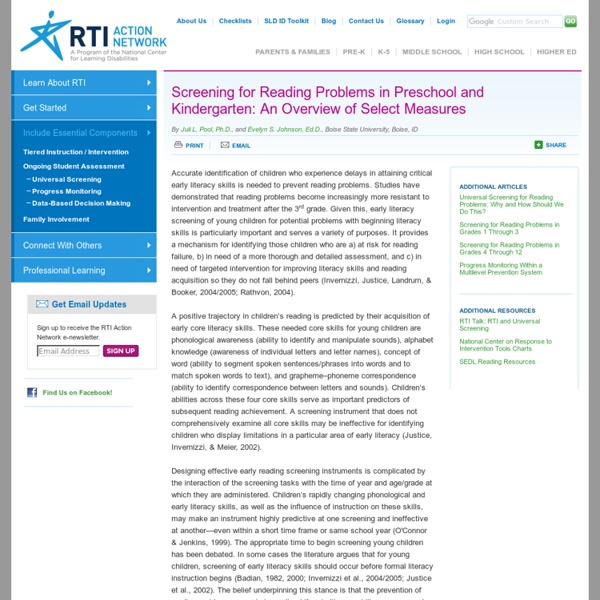Phonological Awareness Assessment: A Foundational Reading Skills Diagnostic Tool
This diagnostic assessment will help you determine exactly which foundational reading skills your emerging readers have under control and which ones they don't. This assessment is designed to assess 16 different phonological awareness skills from most foundational (easiest) to the least foundational (more difficult) covering skills in the Kindergarten and First Grade Reading Foundational Skills standards. Phonological awareness skills are essential for reading development as students become proficient in manipulating sounds auditorily, they become better able to recognize familiar and predicable speech and language patterns when reading orally. This assessment, which I also like to call a "digger deeper assessment" can be used after universal screening to determine an appropriate foundational reading intervention in the area of phonological awareness. Thank You!
Tests? In the First Weeks of Kindergarten?!
As the parent of a child entering kindergarten, you're sure to be shocked and amazed by what's changed since your days on the story rug. Kindergarten isn’t what it used to be. Good news though: while many of the changes you observe make kindergarten a more challenging and potentially pressuring stage, it’s all in the name of teaching your child more effectively. If the buzzword assessment has popped up as you and your child prepare for school, you are not alone. Schools across the nation administer all types of assessments to students of all ages.
Types of Informal Classroom-Based Assessment
[This is an archived article] By: Reading Rockets There are several informal assessment tools for assessing various components of reading. The following are ten suggested tools for teachers to use.
How Should We Measure Student Learning? The Many Forms of Assessment
Linda: The United States is at a moment where it could really transform its assessment systems. Most of our testing is multiple choice tests, pick one answer out of five, which is something you will never do in applying knowledge in the real world. Our assessments need to evolve to reflect the skills and knowledge that we actually value and that we need schools to teach and our children to learn.
Kindergarten Report Cards
Sooner then you’d expect, a big envelope will be headed your way with your child’s kindergarten report card in it. In some cases, just the sheer size of that bulging envelope is a shock. As you tear open the package to find out if the teacher thinks your child is as wonderful as you do, you might think to yourself, “What is all this? Surely the report card itself is not six pages long!” In fact, it may be.
Assessments
Measure student progress to improve overall learning with Reading A-Z's collection of easy-to-use assessment tools for key reading behaviors and foundational skills-alphabet, phonological awareness, phonics, high-frequency words, fluency, and comprehension. More About Assessments Why Use Assessments Assessments help you identify areas of instruction to meet every student's individual needs.
Assessment for Learning in Elementary School
Assessment for Learning in Elementary School Assessment for learning in elementary school: Impact Assessment for learning in elementary school allows students and teachers to improve in a number of areas. The ultimate formula would include teaching quality through professional development resources and services that are practical, researched-based, and proven to increase student achievement. Teachers should transform classroom-level achievement targets into student-friendly settings, and into high quality classroom assessments that accurately reflect student achievement.
Earlychildhood NEWS - Article Reading Center
Traditionally, the issues related to assessment have centered around three key questions: 1) Why should I engage in assessment?; 2) Which methods should I select?; and 3) How should I use the information obtained? In this article, the answers to these questions are explored, along with trends emerging in the field today. Why Engage in Assessment?
Phonemic Awareness Assessment
All assessments should be given one-on-one. When should it be assessed? Phonemic awareness assessments should be done three times during the kindergarten and first grade years to help guide instruction. Examples of assessment questions * Remember, when a letter appears between slash marks, you should say the letter sound, and not the letter name.
ERIC/EECE Digest Archive. Performance Assessment in Early Childhood Education: The Work Sampling System
Performance Assessment in Early Childhood Education: The Work Sampling System EDO-PS-95-6 May 1995 The Work Sampling System The Work Sampling System (Meisels, Jablon, et al., 1995) offers an exemplar of how performance assessment works in Head Start, early childhood, and the primary years (ages 3 to 11).
Speech Sound Disorders: Articulation and Phonology: Assessment
See the Assessment section of the Speech Sound Disorders Evidence Map for pertinent scientific evidence, expert opinion, and client/caregiver perspective. Screening Screening is conducted whenever a speech sound disorder is suspected or as part of a comprehensive speech and language evaluation for a child with communication concerns. The purpose of the screening is to identify individuals who require further speech-language assessment and/or referral for other professional services.



